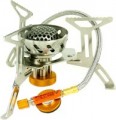Power
The rated power of the burner is the amount of heat generated by it during operation. For models with power control, the value is indicated at the maximum mode.
The nuances of choosing this parameter depend on the type of device. So, the general rule for burners and stoves (see "Type") states that at least 1 kW of power is needed to efficiently heat 1 liter of liquid. And the volumes that you have to deal with depend on the number of tourists and the expected conditions: in a warm climate, 600-700 mL per person is enough for 1 cooking, in a cool one — 1 liter, and it is better to clarify recommendations for different types of extreme tourism in special sources. Thus, the minimum indicator for burners is actually
1 kW, for stoves —
1.5 kW, and the most powerful ones can provide
3 kW or more. Note that more powerful burner models have the appropriate dimensions and weight, and you can heat a large amount of food several times; so for long hikes with luggage carried on you, a relatively low-powered device may be more suitable.
In the case of heaters, it can be assumed that a power of 1 – 1.5 kW is enough for 5 – 7 m2 of area — this is quite enough to heat a tent or tent, higher power is rarely required in fact. And for lamps, the main indicator of efficiency is not power, but luminous flux (see below).
Boiling time for 1 L of water
Approximate time required to boil 1 liter of cold water on the burner. Of course, in fact, the boiling time may differ from the claimed one, since it is affected by the shape and material of the dishes, ambient temperature, etc.; however, this parameter quite clearly characterizes the overall efficiency of the device, it is quite possible to compare different models with each other. At the same time, it should be taken into account that when working with other volumes, the time may not change in direct proportion: for example, if 1 liter requires 300 s, then 2 liters may require not 600 s, but more, but 0.5 L — not 150 s, but less.
Piezo ignition
Built-in flame ignition system based on a
piezoelectric element. Such an element does not require batteries: it generates electricity by pressing the ignition button, and ignition is carried out using an electric spark. This function allows you to do without matches, lighters and other external sources of fire; however, if desired, the flame can be ignited with their help, without the use of piezo ignition.
Preheating
Availability in a torch of function of
preliminary heating of fuel. In such models, the fuel supply system is designed in such a way that the burner flame slightly heats the fuel line during operation.
This function somewhat complicates the design and increases its cost, but increases efficiency and reduces fuel consumption. The presence of preheating is especially important if the device is planned to be used in the cold and/or in high altitude conditions. Under such conditions, the gas pressure at the outlet of the cylinder drops significantly, and liquid fuel can become viscous; both have a negative effect on power and efficiency, while heating allows you to compensate for these phenomena.
Burner diameter
The diameter of the burner provided in the burner or stove (see "Type"). Indicated by the size of the flame corolla in normal operation. First of all, compatibility with dishes depends on this size: the size of the dishes must be at least the diameter of the burner, otherwise effective use will be impossible. In addition, this indicator affects the overall dimensions of the burner; and a larger burner usually means more power (see above), although there is no hard dependency here.
Wind protection
The burner has a special
curtaincovering the flame from the sides. Such a curtain can have a different design: it can be built-in (folding), removable, and can even be made in the form of a screen completely separate from the burner, installed directly on the ground. Anyway, the main purpose of this device is to protect the flame from strong winds. In addition, the curtain can be useful for camouflage — for example, when hunting or during a military-tactical game, when the light from the flame can give the user away.
Replaceable balloons
Models of cylinders for the use of which the burner is structurally designed. Usually, the cylinders specified in the specifications are guaranteed to be compatible with the burner in the standard configuration — up to the point that for models equipped with adapters for different types of fasteners (for example, from thread to collet, see "Cylinder Mount"), this paragraph often indicates both regular and "non-native" cylinders.
Knowing the names of the cylinders, you can easily find fuel for the burner in specialized stores.
Weight
The total weight of the device. Usually, the specifications indicate "dry" weight — excluding fuel.
Lightness is important on long hikes where you have to carry your gear; on the other hand, ceteris paribus, less weight means either low strength and reliability, or greater cost. The lightest classic type burners and lamps (see "Type") weigh
up to 200 g, in the working position, most of the mass of such a device falls on fuel. However, there are also more massive models. For plates, in turn, lightness is not critical, and most of these models are quite heavy —
1 kg or more. In heaters, the weight can be different — from 60 – 70 g in pocket hand warmers to 1.5 kg (or even more) in powerful outdoor appliances.

